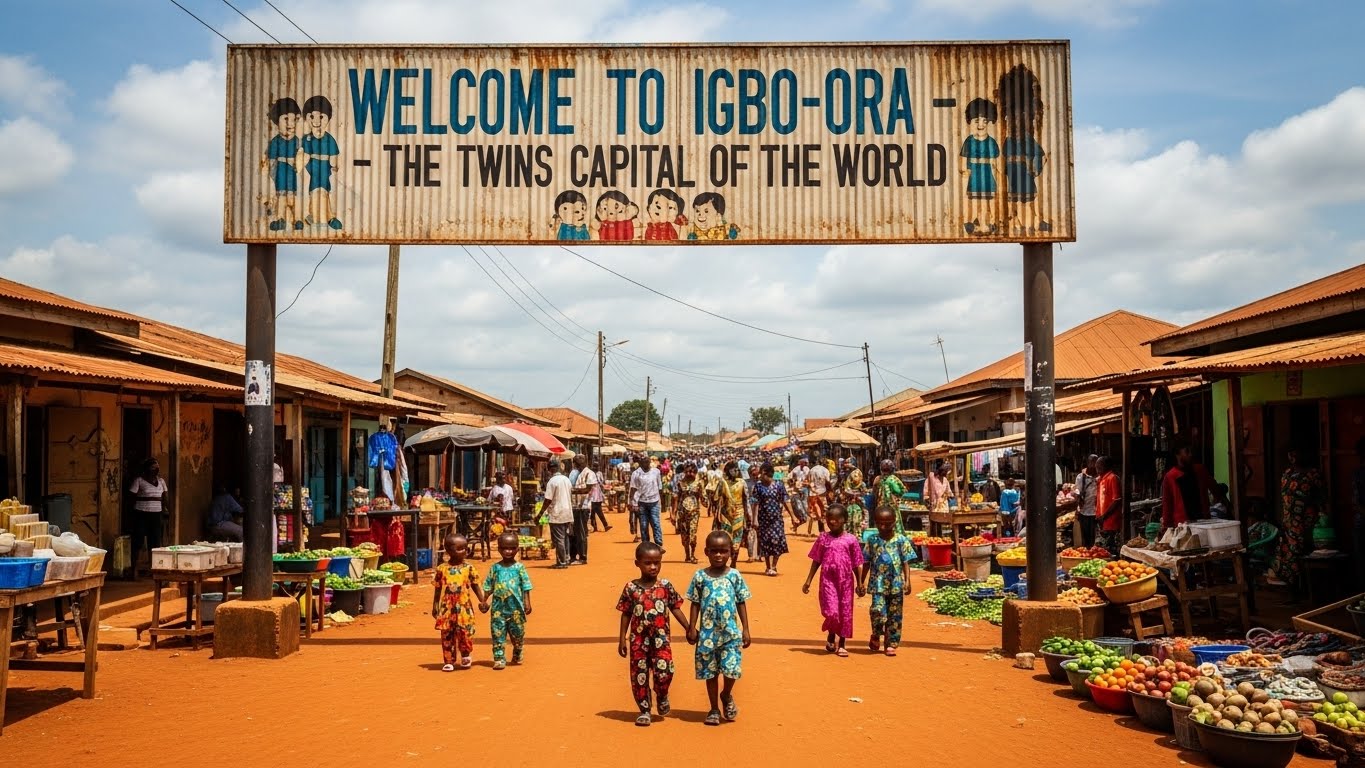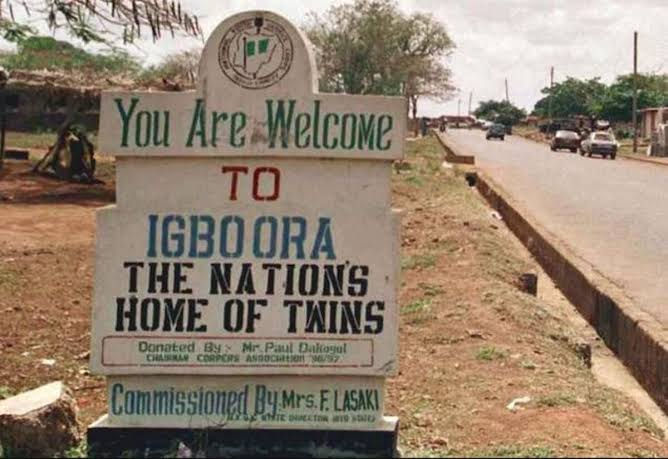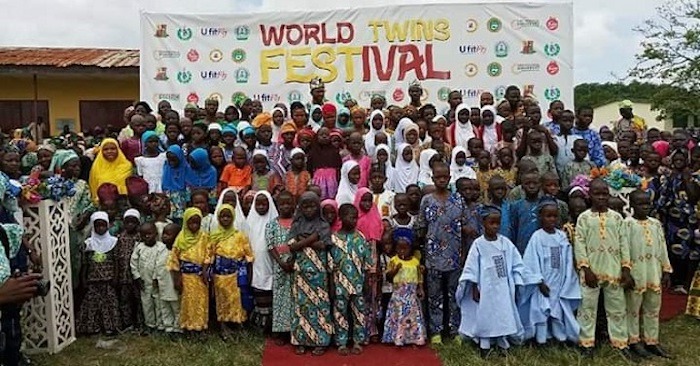Why Are So Many Twins Born in This Nigerian Town?

For many individuals who live in Nigeria they might not have heard of an intriguing phenomenon that has been going on in the quiet community of Igbo-Ora in Oyo State, located in the Southwestern part of Nigeria. There is something extraordinary that happens so frequently in this community that the world can no longer call it a coincidence. This small Southwestern Nigerian community has earned the global and self acclaimed nickname “The Twin Capital of the World” because of one astonishing fact: twin births occur here at rates several times higher than anywhere else on the planet.
For decades, researchers, journalists, anthropologists, and curious travelers have flocked to this town hoping to understand how a single community could defy global biological patterns so dramatically. From the diet of its people to cultural spirituality, genetics, environmental factors, and ancient Yoruba traditions, many explanations have been proposed, yet none have fully answered the question. Igbo-Ora remains a mystery wrapped in culture, science, and living history.
A Town Built by Twins: Where Double Births Are a Normal Way of Life
If you walk through the paths of Igbo-Ora, you would notice something unusual. Two siblings of the same height, wearing matching attires. Two toddlers seated on a bench beside their grandmother. Two nursing mothers strolling with double carriers strapped across their shoulders.
For locals, this isn’t extraordinary at all. In Igbo-Ora, almost every family has at least one set of twins. Some have two or three. There are households with four sets of twins under the same roof. And the stories multiply endlessly, literally.

But what seems like a miracle to outsiders is simply everyday life for the people of this Yoruba community. Twins are woven into the fabric of the community. Names like Taiwo and Kehinde echo through homes, shops, schools, and farms.
In Yoruba tradition, twin births are seen as a blessing, a sign of good fortune, and a connection to the spiritual world. This cultural embrace of twins is part of what makes Igbo-Ora’s story so beautiful, the community doesn’t just produce twins; it celebrates them.
Yet the central question remains: Why here? Why so many?
Culture, Diet, or Destiny? The Scientific Debates Around Igbo-Ora’s Twin Boom
The global average for twin births is roughly 12 sets of twins per 1,000 births. In Igbo-Ora, estimates suggest that the rate could be as high as 45 to 50 sets per 1,000 births, and some reports claim even higher.
There have been various theories and attempts by researchers and curious journalist to explain the phenomenon in the community but it has not been fully yet ascertained; some of them are listed here:
1. The Yam and Cassava Hypothesis
Culture
Read Between the Lines of African Society
Your Gateway to Africa's Untold Cultural Narratives.
This is the most popular explanation you hear in the community. Some researchers believe that Igbo-Ora’s diet, rich in yams, cassava, amala, and elubo, might influence fertility. These foods contain phytoestrogens, plant-based compounds that may promote hyper-ovulation (the release of multiple eggs). Women in Igbo-Ora traditionally consume these foods daily, often in soups, stews, and solid meals.
However, this theory has never been conclusively proven. Cassava and yams are eaten widely across West Africa, yet other towns do not produce twins at this level.
2. Genetic Lineage and Yoruba Ancestry
Another explanation is genetic. The Yoruba ethnic group already has one of the highest twinning rates in the world. Igbo-Ora, being deeply Yoruba, may simply represent a concentrated genetic pool where the “twinning gene” appears with exceptional frequency.
Families in the town report twin births spanning several generations, suggesting a hereditary component. But science is still exploring whether such a gene truly exists.
3. Environment and Natural Selection
Some researchers propose that environmental factors, water minerals, soil content, or vegetation, may contribute. Igbo-Ora’s ecosystem is unique, with a rural landscape, farmlands, and natural water sources.
Historically, communities with high child mortality sometimes developed higher fertility patterns through natural selection. Twin births may have been a biological response that became embedded in the population over centuries.
4. Cultural Acceptance and Accurate Reporting
In some societies where twins were once stigmatized, twin births were often hidden. But in Igbo-Ora, twins are celebrated with rituals, naming traditions, and festivals. This cultural embrace has likely encouraged more accurate reporting over time, amplifying the town’s twin statistics.
Whatever the explanation, the mystery of Igbo-Ora continues to intrigue the world, making it a unique blend of science, culture, and destiny.
A Cultural Legacy: Twins in Yoruba Spirituality, Tradition, and Identity
To understand Igbo-Ora, you must understand the Yoruba worldview surrounding twins. In Yoruba cosmology, twins, known as Ibeji, are considered powerful, spiritual beings. They are believed to possess a shared soul, carrying divine energy that blesses the household.
When twins are born, families hold special celebrations. Often, parents keep small carved wooden figurines called ere ibeji, symbolizing protection for the twins. These figurines are treated with care, dressed, bathed, and celebrated, especially if one or both twins pass away in infancy.

Culture
Read Between the Lines of African Society
Your Gateway to Africa's Untold Cultural Narratives.
Twins also have traditional foods associated with them, such as beans and akara, believed to bring them blessings and long life.
This reverence shapes the community’s psychology. The people of Igbo-Ora love twins, expect twins, and celebrate twins. In many ways, the culture reinforces a cycle that keeps the phenomenon alive.
Every October, the town hosts the World Twins Festival, attracting thousands of twins from across Nigeria and beyond. The streets fill with matching outfits, traditional dances, photography sessions, and exhibitions celebrating twinhood.
The festival has become a cultural export, drawing tourists, researchers, and international journalists eager to witness the wonder firsthand.
A Mirror for Africa: What Igbo-Ora Teaches Us About Heritage, Identity, and Hidden Knowledge
Igbo-Ora is more than a scientific curiosity, it is a cultural landmark that reminds Africa of the richness of its heritage and the depth of indigenous knowledge systems that remain underexplored.
It teaches us that Africa’s mysteries are not confined to ancient pyramids or forgotten ruins. Some are alive, living in everyday communities, encoded in the bodies, cultures, and traditions of ordinary people.

The story of Igbo-Ora challenges modern assumptions about science. It pushes researchers to look beyond Western frameworks and consider local diets, ancestral knowledge, ecological factors, spirituality, and genetics as interconnected.
It also invites Africans everywhere to ask important questions:
How many other communities hold world-shaping mysteries?
How much indigenous knowledge remains undocumented?
How do culture and biology intertwine more deeply than we think?
Are there hidden scientific breakthroughs waiting in rural towns and cultural traditions we overlook?
Igbo-Ora stands as proof that Africa remains a continent rich not only in natural resources but in intellectual, cultural, and biological treasures.
Culture
Read Between the Lines of African Society
Your Gateway to Africa's Untold Cultural Narratives.
As global scientists continue studying the town, one truth remains: the people of Igbo-Ora already understand their identity.
For the world, Igbo-Ora is a mystery. For its people, it is simply home.
You may also like...
Premier League Fury: Chelsea & West Ham Hit With Heavy Fines Over Mass Brawl

Chelsea and West Ham have been hit with significant fines by an independent regulatory commission following a mass confr...
NBA Shocker: Luka-LeBron Botch Crushes Lakers' Hopes Against Magic

The Los Angeles Lakers suffered a narrow 110-109 defeat to the Orlando Magic, following a critical botched inbounds play...
Ryan Gosling Shines in 'Project Hail Mary,' Early Buzz Hails 'Must-See Space Odyssey'

Phil Lord and Christopher Miller's "Project Hail Mary" is receiving stellar early reviews, with critics calling the sci-...
Margot Robbie's Latest Epic Love Story Dominates Box Office, Outperforms 'RRR'

"Wuthering Heights," director Emerald Fennell's controversial adaptation of Emily Brontë's novel, has achieved significa...
End of an Era? Mike Patton Hints at Faith No More Split, Fans Brace for Impact

Mike Patton suggests Faith No More's active period may be over, citing an unspoken sense of closure after their last per...
Rock & Roll Hall of Fame Shakes Up 2026 With Star-Studded Nominee List and Artist Reactions

The Rock & Roll Hall of Fame has announced its 17 nominees for the Class of 2026, featuring 10 first-time contenders lik...
Snoop Dogg Unveils Shocking Connection to Bitter Beckham Family Spat

Hollywood megastar Snoop Dogg has weighed in on the ongoing Beckham family feud, which saw Brooklyn Beckham publicly acc...
Shawn Hatosy's Shocking 'Twin, Wife, Mom' Remark on Sarah Michelle Gellar's Ursula

"Ready or Not 2: Here I Come" picks up immediately after the first film, as Grace's survival triggers a new, dangerous g...






